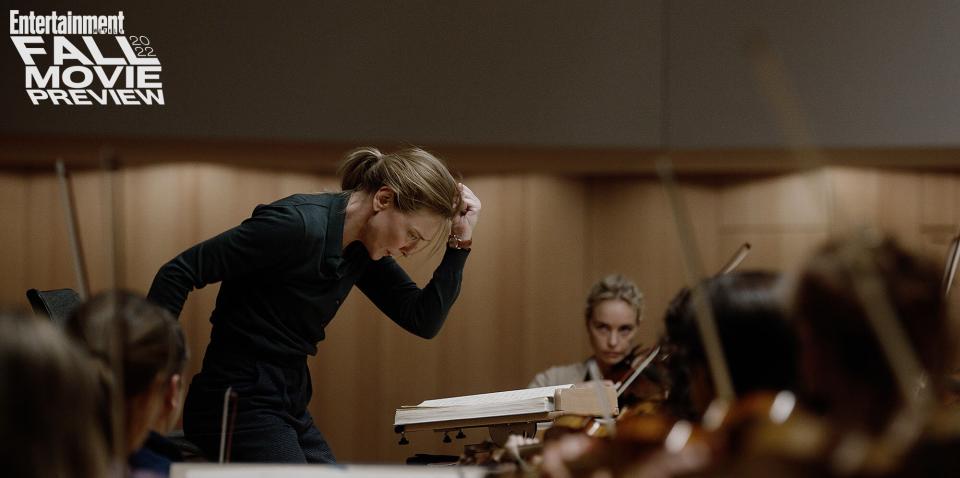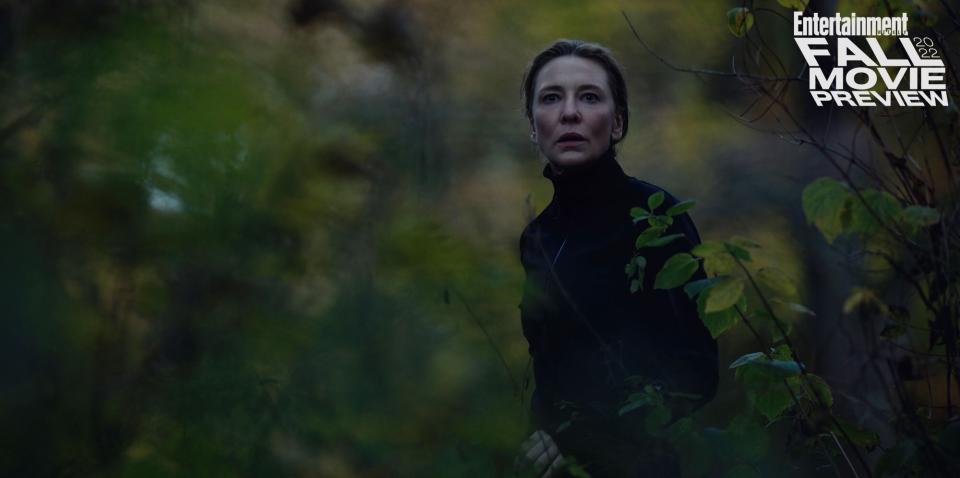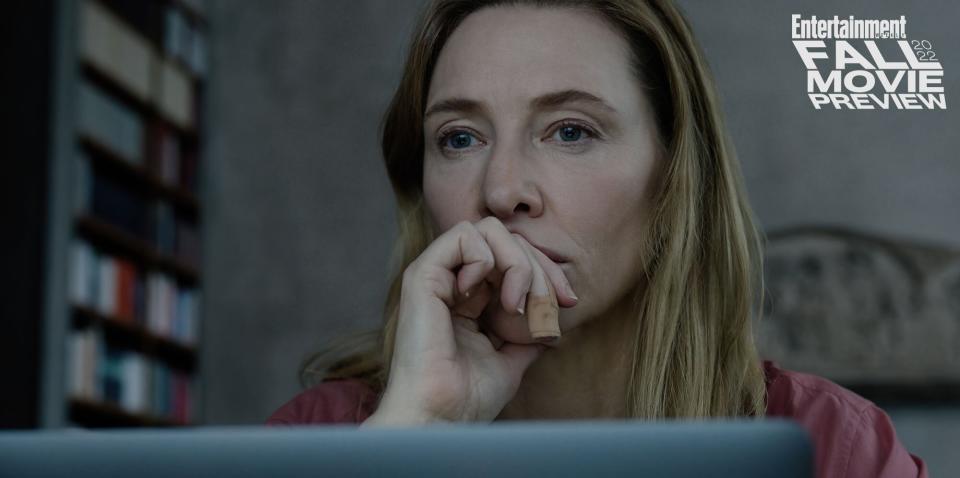Cate Blanchett on her ferocious TÁR turn: 'She believes in the power of being the exception'
- Oops!Something went wrong.Please try again later.
- Oops!Something went wrong.Please try again later.
- Oops!Something went wrong.Please try again later.
After months of living in the skin of Lydia Tár — the fictional orchestra conductor and EGOT winner whose fall from grace is the subject of the new movie that bears her name — Cate Blanchett can sum up her character pretty quickly.
"I think about Lydia as being the right person at the wrong time," the actor says. "In a way, the film is all about time."
Conductors shape time literally, with their hands or a baton. To watch Blanchett throw herself into the technical precision of the most demanding role of her career is one of the year's most breathtaking sights. There's also a hint of her turn in Blue Jasmine, hauteur and arrogance swirling with a hidden vulnerability, as well as a taste of Blanchett's clipped, pitch-perfect Katharine Hepburn in The Aviator. (Not for nothing are the Oscar drums pounding; those two movies are the ones that got Blanchett to the podium for her pair of wins to date.)
But TÁR — and mind the capitalization, there's a point to it — is also about time in an extremely now sense, that of time being up: time's up for Mahler and highbrow entitlement, time's up for powerful yet abusive geniuses. It's what makes the film especially provocative.

Focus Features
"We are living in a time when the great canon is being pulled down," Blanchett, 53, says. "And what happens if you spent your entire life wanting to be at the point of that greatness, and you are born at the point when it's all crumbling?"
That's not to say Lydia doesn't have it coming. Ominously structured like a slo-mo self-torching, TÁR features scene after scene of Lydia taking liberties that mark her as someone dangerously out of touch — speaking brusquely to a student of color, grooming the young, fawning women in her orbit, bestowing or denying favors, savoring her privilege.
"I wanted to really talk about power, and the structures and pipelines that are in place for power, in this case, in a kind of temple of art," says writer-actor-filmmaker Todd Field. After notching two impressive dramas at the start of his directorial career, In the Bedroom (2001) and Little Children (2006), Field went off the radar for 16 years, during which his big-canvas ideas — an adaptation of Cormac McCarthy's horror-western Blood Meridian, sweeping projects with Joan Didion and Jonathan Franzen — never got greenlit.
Field, 58, describes the long dry spell as a change of priorities spurred by the unexpected arrival of a third child. "I decided then that if I was going to take off for a year-plus to make a film, it better be for a very good reason, personally," he says. But he also admits it wasn't for lack of trying. "I worked with a sincere and enthusiastic heart on many things with wonderful collaborators over the last 16 years. And for whatever reason, based on what the material was or the ambition or the lack of interest from other people, they simply didn't happen."
You get the sense that with TÁR — which grips hard on the third rail of cancel culture — Field wanted his comeback to count. The movie isn't the kind that often comes from Hollywood, or anywhere, really. (It was financed by Focus Features.) Field wrote it at the start of the pandemic, mainly for himself, he claims, though he had a Post-It note of Blanchett's name on his desk for inspiration.
"Every day, I sat down and I said, 'Good morning, Cate,'" Field recalls. "And she said nothing. And I kept working and hoping that eventually she would say good morning back, and got very lucky that she did. But she had no idea that I was writing for her, nor did anyone else."

Focus Features
Blanchett calls the role a feast. "It's very rare that you receive a script that is so perfect in every way, linguistically, visually, rhythmically," she says. "And then, Todd's ideas for casting were just — I was absolutely thrilled by them." Blanchett's two chief co-stars, Germany's subtle Nina Hoss (Phoenix) and the French-born Noémie Merlant (Portrait of a Lady on Fire), turn in performances complex enough to merit biopics of their own.
Mastering the rhythms and mannerisms of an unraveling Lydia Tár required intense preparation, "fueled by absolute terror," Blanchett says. She learned a scary amount of German so she could speak it casually in front of her Berlin-based orchestral colleagues, with whom Lydia has worked for years. She took piano lessons. She trained in the choreography of conducting. She learned to do all these things together in long, extended takes.
"No serious actor ever wants to talk about their homework because we're in the invisibility business, and we shouldn't be trotting any of this out," says Field, himself a veteran of Stanley Kubrick's intense Eyes Wide Shut. "But it's like, imagine another world in which Tom Hanks and Bill Paxton could have actually flown to the moon. It's fairly extraordinary."
Lydia herself is performing, sometimes desperately, through a veneer of confidence. It's part of Blanchett's triumph that you notice as much right away during a lengthy interview scene that opens the film. The Australian-born actor would rather not fixate on her craft ("That's just the stuff you have to do to get to first base"), instead shifting our conversation toward TÁR's meat.
"She believes in the power of being the exception," Blanchett says of Lydia. "And she wants the chance to fly. But also I think the Achilles' heel and the Greek nature of this is that once you reach the peak of a mountain, the only way is down. And so there's a willful destructiveness as much as there is a very strong creative urge in her. For me, that's where the film really lives."

Focus Features
Field can't judge his creation, even at her worst moments. He's made something that's still changing in his own eyes, after years of dreaming it.
"The only bad thing is if somebody shrugs and they're indifferent," he says. "I see her differently every single time I watch the film. So does my editor. We've had long conversations about how we feel about her at different points. So I hope that's all there. Cinema, like music, thrives on subjective associations. And it's really like, What are you bringing into a theater with you that day?"
There are many real-life Lydia Társ (some, like James Levine and Charles Dutoit, are even name-checked in the film itself), conductors who, deafened by applause and the nightly channeling of musical glory, overstepped their bounds. All of them are men. Field is adamant about pushing his story into a less reactionary zone, beyond MeToo. "It's a very important and vital part of our reality right now," he says, "in terms of being able to talk about things that haven't been talked about. But unfortunately, it has not been a terribly nuanced conversation."
TÁR could change that. In a perfect world, it would lead to a wider discussion beyond the one you'll inevitably be having in the lobby.
"I think the questions for me, really, are not so much about agenda, but what is permissible when trying to approach something great?" Blanchett says. "And what are the costs?"
TÁR is in theaters now.
Related content:

